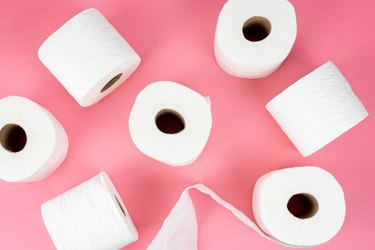
Does it seem like you're running to the bathroom more often than you used to? It's common for age-related changes to cause you to have to urinate more often — and to make that gotta-go feeling more intense.
"The cause of overactive bladder isn't entirely known, but aging is known to be a risk factor," says Karyn Eilber, MD, a urologist with Cedars-Sinai Medical Center.
Video of the Day
Video of the Day
That's the case for both people assigned male at birth (AMAB) and those assigned female at birth (AFAB), notes Dr. Eilber, who adds that it's possible to start experiencing changes to your urinary frequency as early as your 40s. Many people AFAB, though, don't notice a change until they reach menopause.
As for how often you should pee? The average adult urinates about seven times per day, according to the Cleveland Clinic. It's normal to occasionally have higher- or lower-flow days, but regularly having to pee much more than that could be a sign of overactive bladder.
"Urinating more than eight times during the waking day and more than two times per night is considered abnormal," says Kelly Casperson, MD, a urologist with Pacific Northwest Urology.
If you're wondering what, exactly, is responsible for the increased need to urinate, there are a few different factors at play. Here's a look at some of the most significant ones, plus what you can do if it feels like your day is being dictated by trips to the bathroom.
1. Weaker Pelvic Floor Muscles
Aging as well as childbirth can contribute to a loss of muscle mass in the pelvic floor, Dr. Casperson says.
Located between the pubic bone and the tailbone, this band of muscles supports the bladder and the anus. When the muscles lose mass and weaken, it can make it harder to fully empty the bladder, according to the National Institute on Aging (NIA).
This can result in having to go more often as well as urine leakage.
Related Reading
2. Enlarged Prostate
The prostate is a golf ball-sized gland in people AMAB that produces some of the liquid for ejaculation.
The prostate continues to grow with age, but if it gets too big, it can place pressure on the bladder and cause the urge to urinate more often, according to the Cleveland Clinic.
Prostate enlargement, called benign prostatic hyperplasia, is common and can typically be treated with medication.
3. Bladder Tissue Changes
The bladder's stretchy, elastic tissue can become stiffer with age, shrinking its capacity to store urine, according to the NIA. That can result in needing to go more often.
These tissue changes can also cause the bladder to contract involuntarily, increasing the chance for urine leakage, per the Mayo Clinic.
4. More UTIs and Other Infections
Urinary tract infections are the most common cause of frequent urination, according to the Cleveland Clinic, and these infections become more likely with age.
Postmenopausal people AFAB, in particular, are prone to more UTIs: Lower levels of the hormone estrogen can decrease production of friendly bacteria (such as Lactobacillus), according to Harvard Health Publishing. This, in turn, can lower vaginal pH, making it harder to keep infection-causing bacteria at bay.
5 Ways to Manage the Urge to Pee

Constantly having to pee doesn't have to be a way of life. These strategies can help rein in the nonstop need to run to the bathroom.
1. Urinate Often, but Not Too Often
It's generally recommended to try urinating at least every three to four hours, because holding in urine for too long can cause the bladder muscles to weaken and increase the risk for infection, per the NIA.
You needn't be running to the bathroom the second you get the urge to go, though. "Bladder training, which is intentionally postponing urination with increasing intervals over time, can reduce urinary frequency over time," Dr. Eilber says. (Here's how to give it a try.)
2. Pay Attention to Your Liquid Intake
Tend to drink a few big glasses of water each day? Switching to smaller sips that are more spread out can often reduce intense urges to go, Dr. Casperson says.
Staying hydrated is important, but make sure you're not drinking more than you need to. If you're on the smaller side, not very active or don't sweat much, you may not need the oft-touted eight glasses per day, says Dr. Eilber. Just drink in accordance with your thirst instead.
3. Watch the Alcohol and Caffeine
Both can irritate the bladder and increase the urge to urinate, so consider cutting back.
Keep in mind, too, that drinking alcohol before bed can make you more prone to having to pee in the middle of the night, Dr. Casperson says.
4. Consider Supplements or Estrogen for UTIs
Consider adding a cranberry supplement if you're prone to urinary tract infections, Dr. Eilber recommends. Cranberries contain compounds that may make it harder for infection-causing bacteria to stick to the bladder, which could help keep UTIs at bay, per the Cleveland Clinic.
Talking with your doctor about hormone-based options may help too. "Menopausal women may consider some type of vaginal estrogen supplement, as the estrogen promotes the growth of good bacteria," Dr. Eilber says.
5. Try Kegels
Regularly performing pelvic floor-strengthening exercises like kegels can help reduce urinary frequency, urges and leakage, per the NIA.
They may also reduce the risk for UTIs and other infections by making it easier to fully empty the bladder when you urinate. (A daily regimen is good — just don't overdo it.)
6. Consider Pelvic Floor Therapy
Kegels aren't the only pelvic floor exercise that can help calm an overactive bladder. If at-home measures aren't doing enough to reduce your urinary frequency, consider seeing a pelvic floor specialist.
"They can help decrease frequency and urgency by retraining the bladder-brain connection and strengthening the pelvic floor," Dr. Casperson explains.
- Cleveland Clinic: "How Often Should You Pee During the Day?"
- National Institute on Aging: "15 Tips To Keep Your Bladder Healthy"
- Cleveland Clinic: "Urination: Frequent Urination"
- Mayo Clinic: "Urinary Incontinence"
- Harvard Health Publishing: "“Not Again!” — When UTIs won’t quit at midlife"
- Cleveland Clinic: "Can Cranberry Stop Your UTIs?"
- InformedHealth.org: "Bladder Training"
Is this an emergency? If you are experiencing serious medical symptoms, please see the National Library of Medicine’s list of signs you need emergency medical attention or call 911.